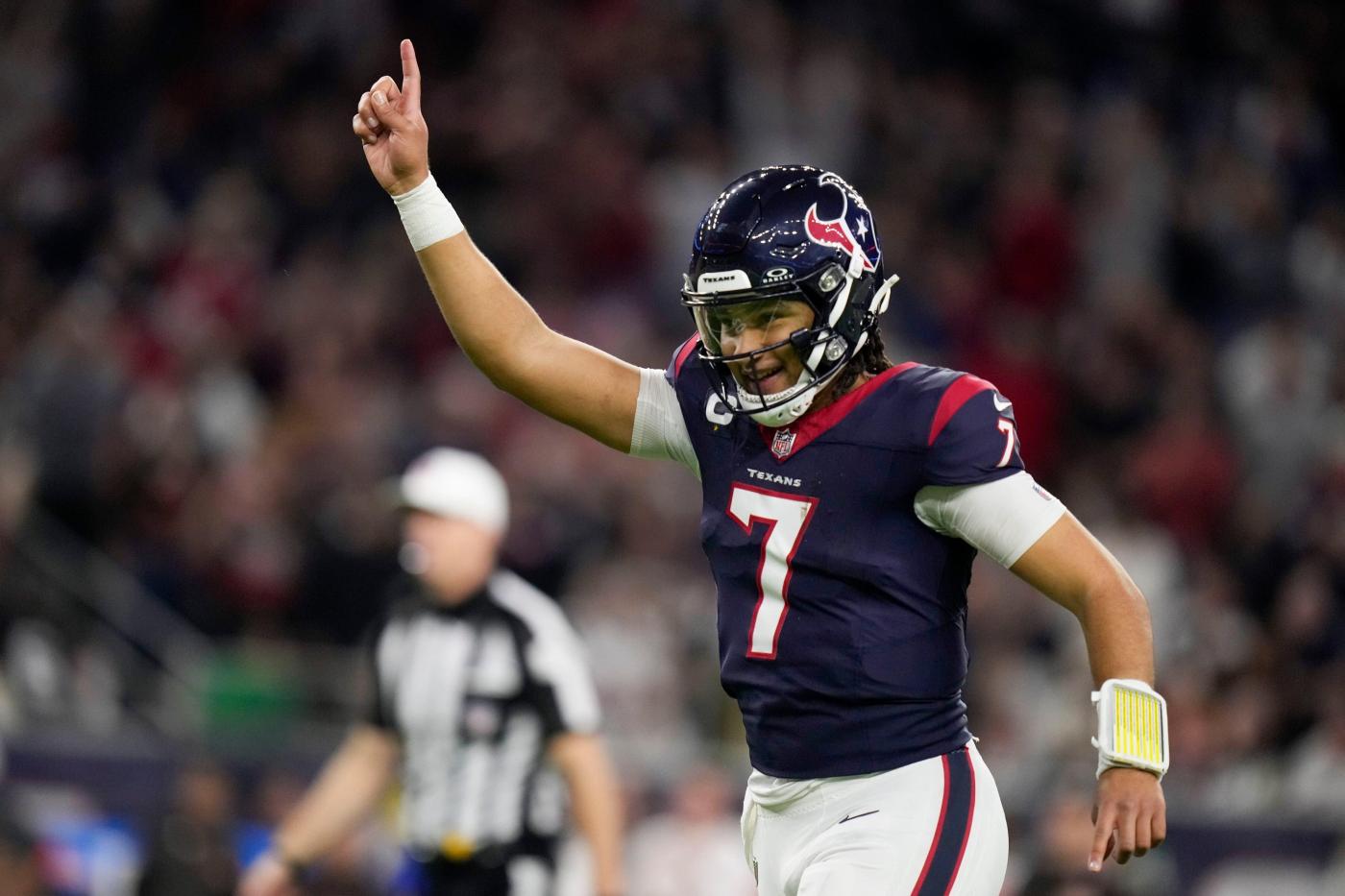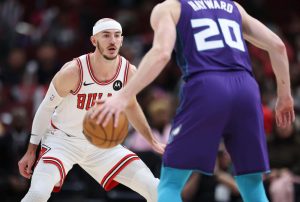
Column: What the Chicago Bears can learn about turning a franchise’s fortunes from the Houston Texans
With Matt Eberflus and Ryan Poles hitting the road in a quest to fill out the Chicago Bears coaching staff with new hires who can help guide the franchise to the next level — relevancy in the postseason — the Houston Texans shine as the most recent example of how quickly a team’s fortunes can turn.
The Bears and Texans were the worst in the NFL in 2022 — both finished 3-14 — and as Eberflus seeks to reboot the majority of his offensive staff and find a defensive coordinator, Houston is preparing for a playoff game.
The Bears have reportedly interviewed Seattle Seahawks offensive coordinator Shane Waldron, Seahawks quarterbacks coach Greg Olson and San Francisco 49ers passing game coordinator Klint Kubiak for their offensive coordinator opening. Kentucky offensive coordinator Liam Coen is also reportedly on the radar. Surely, there are more names on Eberflus’ list.
Houston, the AFC South winner, blew out the Cleveland Browns 45-14 in their wild-card meeting Saturday as rookie quarterback C.J. Stroud shredded the league’s No. 1 defense, completing 16 of 21 passes for 274 yards, three touchdowns and a passer rating of 157.2. Stroud is expected to be the runaway winner of offensive rookie of the year honors and Texans offensive coordinator Bobby Slowik, 36, has become a hot name for teams seeking a head coach. Slowik’s father, Bob, was the Bears defensive coordinator under Dave Wannstedt from 1993-98.
The younger Slowik’s rise has been meteoric. He broke into the NFL as a defensive assistant in Washington in 2011 under Mike Shanahan and worked there for three seasons. From 2014-16, he was an analyst for Pro Football Focus. In 2017, Kyle Shanahan hired Slowik as a defensive assistant in San Francisco. After two years in that role, he was an offensive assistant for two seasons. He became the offensive pass game specialist in 2021 and the offensive passing game coordinator in 2022 before first-year head coach DeMeco Ryans took him from the 49ers to the Texans as coordinator.
That’s how fast things can move for teams that get the quarterback position figured out. A coordinator who is a year older than Matthew Stafford and Kirk Cousins can become a head coaching candidate and a franchise that was stumbling — the Texans had five seasons with four wins or less in the previous 10 years — appears set as a contender into the future with Stroud, who was the fifth quarterback in league history to pass for 4,000 yards as a rookie.
Stroud and a new coaching staff are not the only elements that expedited the Texans’ ascent. Houston traded up for another first-round selection to get edge rusher Will Anderson at No. 3, one pick after Stroud. While the Bears were aggressive in free agency, signing linebackers Tremaine Edmunds and T.J. Edwards, right guard Nate Davis and later edge rusher Yannick Ngakoue, Houston was a smaller player on the open market.
The Texans added wide receiver Robert Woods ($15.25 million, two years), defensive tackle Sheldon Rankins ($9.75 million, one year) and tight end Dalton Schultz ($6.25 million, one year). That was it for costly additions.
Poles doesn’t believe an error was made in passing on Stroud in last year’s NFL draft and sticking with Justin Fields, who has now made 38 starts through three seasons, citing the windfall the Bears received from Carolina by trading the No. 1 overall pick that turned into quarterback Bryce Young for the Panthers.
“I don’t think so at all,” Poles said last week. “I think you have to take in what’s best for your team. So when you look at that situation and how it ended up playing out, to have DJ (Moore), to have (right tackle) Darnell (Wright), to have (cornerback Tyrique) Stevenson, to have the first overall (pick this year) and to have the second (-round pick from Carolina) next year, I feel like that’s the best for our organization.”
There’s no debating the Bears are in a better position with their roster than they were a year ago and it’s a better supporting cast for a young quarterback than what the Texans had for Stroud this year. Moore is a bona fide No. 1 receiver for a team that has struggled to find one. Wright and Stevenson profile as foundational pieces moving forward and there is more draft capital to come.
Stroud’s top wide receiver, Nico Collins, produced only 70 receptions for 927 yards in his first two seasons. Now, Collins is a star. Woods is a possession receiver at the end of his 11th season, a veteran without a lot of juice remaining. Rookie wide receiver Tank Dell, a third-round pick, made some big plays but he’s 5-foot-8, 165 pounds, and has been on injured reserve since Week 12.
It’s not like Stroud walked into a situation that appeared loaded or even marginally designed for success. In May, sportsbooks had the Texans’ over/under for wins at 5 1/2, the lowest in the AFC South. Stroud, in Slowik’s system, is what made the parts around him better and now there’s no haul of draft picks and a stud player (like Moore) that could pry him away from Houston. Stroud has been so successful in Year 1, he’s going to raise the bar of expectations for future rookie quarterbacks.
What’s exciting for Poles, Eberflus and whoever winds up being hired as offensive coordinator is the options the Bears have with the first and ninth picks in the draft and a touted class of quarterbacks available.
The Bears can take a quarterback with the first pick or they can trade back from No. 1, get a haul of picks/players, and then take a quarterback. They have to draft a quarterback.
After the 2008 season, when the Bears won four of five games before a win-and-reach-the-playoffs finale at Houston that turned into a 31-24 loss, then-GM Jerry Angelo said, “It’s all about the quarterback. You don’t win because of wide receivers. You don’t win because of running backs. You win because of the quarterback.
“We have gone through so many different scenarios at that position we can write a book, more so on what not to do than what to do.”
If the Bears get the right one, the roster is in place for them to take off.
“It’s built on a solid foundation,” Poles said. “It’s not a house of cards. It’s going to continue to go up as we continue to have continuity with our roster. That makes the future really bright for us.”
Fifteen years later, Angelo’s words remain an excellent guideline for Poles and Co. Imagine what a wonderful problem it would be for the Bears to have a fast-tracked offensive coordinator at this time next January — and their own franchise quarterback.
()

